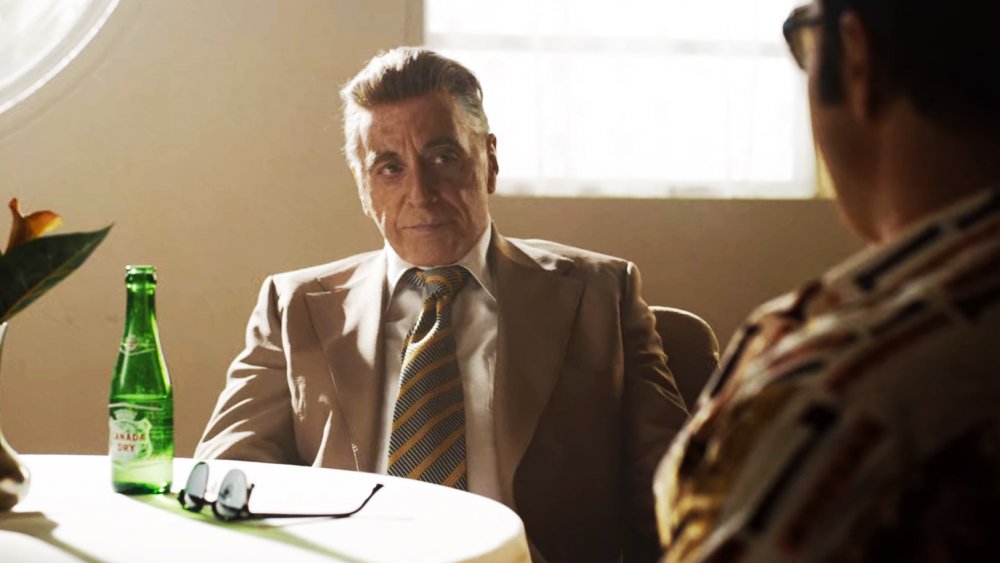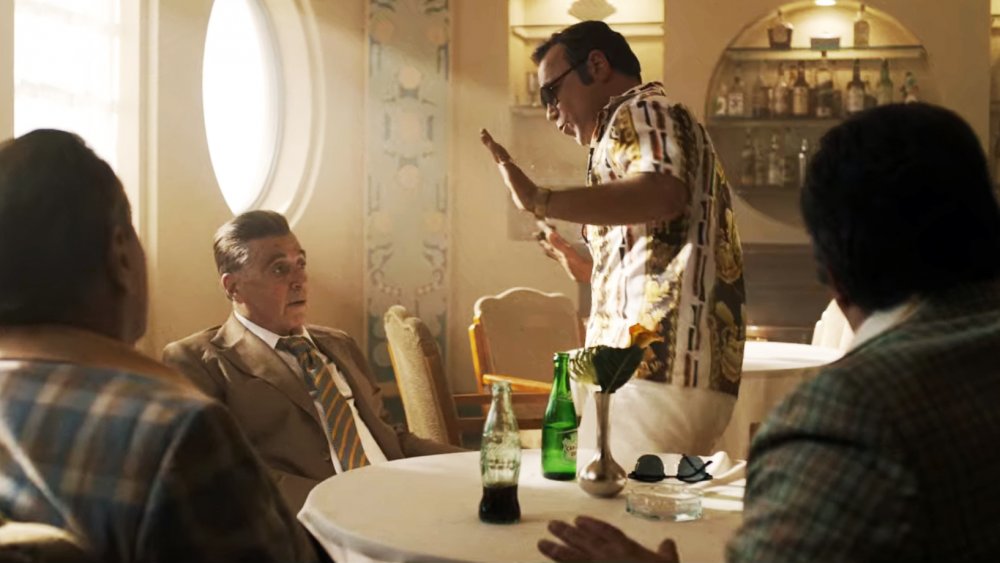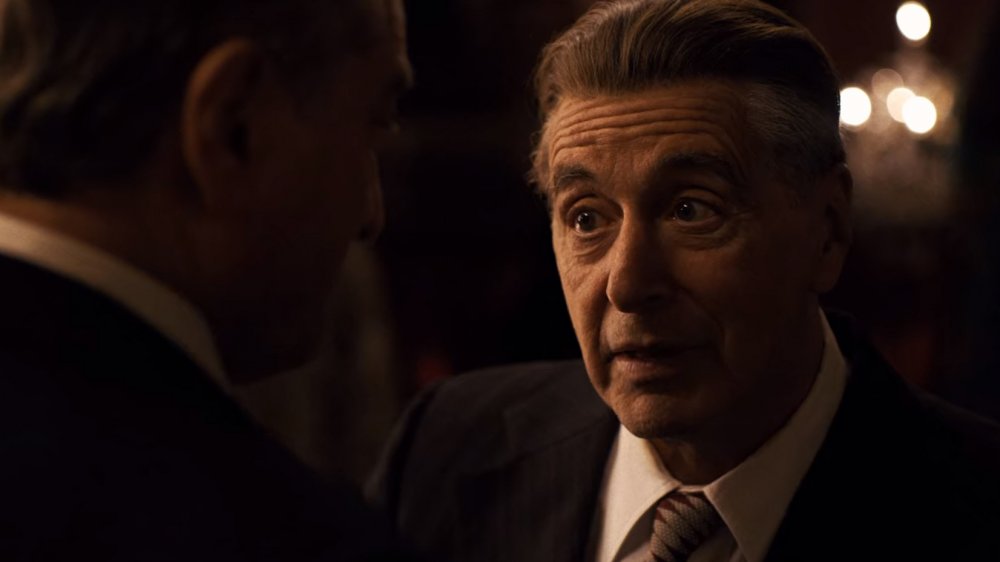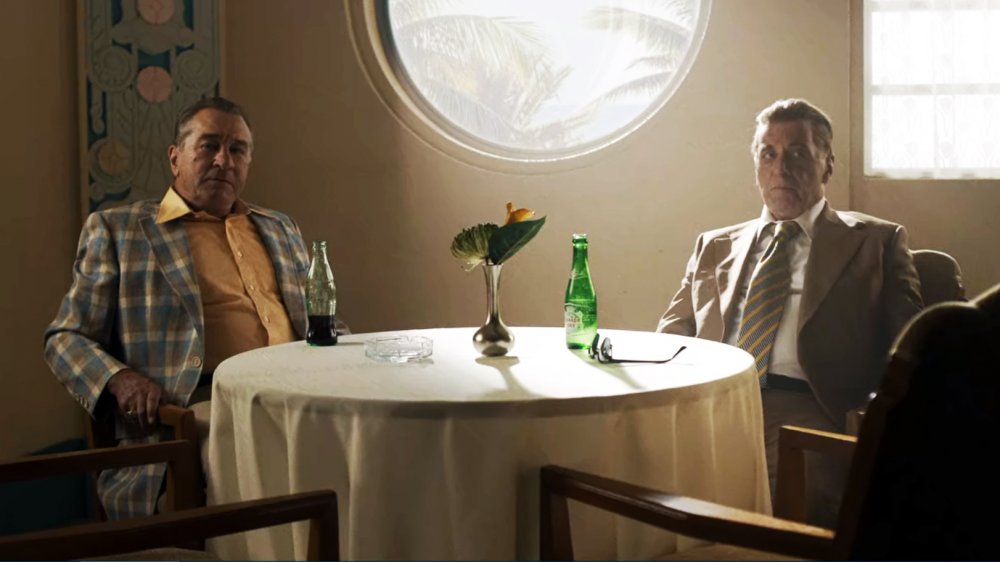The One Irishman Scene That Makes Us Love Al Pacino Even More
This content was paid for by Netflix and created by Looper.
Martin Scorsese. Robert De Niro. Joe Pesci. Al Pacino. If you love movies, that's pretty much all you need to know about The Irishman, Scorsese's star-studded adaptation of Charles Brandt's I Heard You Paint Houses. Like the book, the movie tells the story of real-life mob hitman Frank Sheeran, who claims that he was the one who killed infamous Teamsters president Jimmy Hoffa.
It also contains some of its cast's best performances ever, especially when it comes to Pacino, who plays Hoffa himself. Set across multiple decades, The Irishman begins when Hoffa is at the height of his power, then slowly traces the union boss' decline as he's sent to jail, struggles to regain his lost position, grows increasingly unstable, and ultimately meets his demise at the hands of his best friend. Throughout it all, Pacino proves why he's one of the greatest actors of his generation as he imbues Hoffa with a real, nuanced humanity even while portraying him as the larger-than-life figure he really was.
Pacino's performance really comes together about two hours into The Irishman, when Hoffa is nearing his lowest point. As he tries to regain control of the Teamsters, Hoffa meets with Anthony "Tony Pro" Provenzano in an effort to get the mobster's endorsement. Unfortunately, Hoffa and Tony Pro had a falling out while in prison, and the conversation that follows starts out incredibly tense. It only gets worse from there.
It's his underrated comedy chops
Here's the thing about Al Pacino: He may not do as many conventional comedies as his Irishman co-star Robert De Niro, but when he tries, he's really, really funny. The Irishman proves it. The last piece of advice Hoffa gives to his son — "Never put a fish in your car.... Remember that. It'll help you in life" — is absurd, but Pacino delivers the line with so much fatherly sincerity you can't help but laugh. Hoffa's impromptu victory speech after he survives a botched assassination attempt is full of great one-liners. "Charge with a gun, with a knife you run," Hoffa quips, before yelling, "Hey! I rhymed!"
But Pacino's funniest moments in The Irishman come during Hoffa's showdown with Tony Pro. When Tony arrives, he and Hoffa immediately begin bickering about punctuality, Florida traffic, and whether or not shorts are appropriate meeting attire. The two men are deadly serious, but it's easy to imagine those same conversations playing out word-for-word on a show like Seinfeld or Curb Your Enthusiasm.
The best part, though, comes right at the beginning of the conflict, when Tony Pro bursts into the room. "Can you believe this weather, Frank? It's 85 degrees outside," Tony exclaims. "People freezing to death in New York, and look at us."
Hoffa just stares. "It's summer," he deadpans. "People aren't freezing to death in New York. It's summer." Tony Pro just deflates, all of his friendly bluster gone. It's a great line that ratchets up the tension for the argument that follows. It's also a laugh-out-loud moment, and it works precisely because of Pacino's underrated sense of comedic timing.
It's how Pacino commands the screen, but knows when to let others shine
It's hard to overstate just how perfect casting Pacino as Hoffa really is. Throughout his 14-year run as the president of the Teamsters, Hoffa was a major political player and had an huge influence on American culture. These days, thanks to his disappearance in 1975, he's taken on near-mythological status. It's a role that begs for a legendary actor.
Thankfully, Pacino fits the bill. Early in The Irishman, Pacino's Hoffa demands attention. Watch as he introduces himself to Sheeran during a "casual" phone chat that's really anything but ("Thought I was talking to General Patton," Sheeran quips, once the call is over). Watch him deliver a speech rallying against Bobby Kennedy to a crowd of cheering Teamsters. Watch him chew out a room full of his most loyal lieutenants, whose mismanagement is going to land Hoffa in jail. You can't take your eyes off him.
Similarly, when the meeting with Tony Pro starts, Hoffa is in complete control. He shuts Tony down with a quick joke. He laughs condescendingly when Tony blames his tardiness on traffic. When Tony asks "Am I beneath you?" and Hoffa answers "Definitely," it's hard to say he's wrong.
But then, something happens. Tony Pro, played to perfection by Stephen Graham, refuses to back down. He calls Hoffa out on his hypocrisy. He points out Hoffa's vulnerability. He gets under Hoffa's skin — and, suddenly, all of Pacino's charisma is gone. Hoffa begins floundering, and in an instant he's not the commanding presence we expect. He's desperate. He's egotistical. Ultimately, he's pathetic. The change is instantaneous and remarkable. Many actors have stage presence, but how many can turn it on or off as the scene goes on? Very, very few — but Pacino is one of them.
It's how he's not afraid to turn it up to 11
Whether he's introducing gangsters to his little friend, yelling "hoo-ah!" in a crowded courtroom, sticking it to Dick Tracy under layers of make-up, barking orders at the Miami Sharks, or hamming it up as the literal Christian devil, Al Pacino has never been afraid to go big. It's one of his trademarks. Compared to many of his other performances, Pacino's turn as Jimmy Hoffa in The Irishman is actually pretty constrained. Still, this is Pacino. Even when he's holding back, you know there's something wilder lurking under the surface, and it makes every scene with Hoffa that much more tense.
In the meeting with Tony Pro, it finally comes out, if only for a second. Throughout the meeting, Tony Pro demands an apology from Hoffa for a slight he suffered the last time the two met (Hoffa referred to Italians as "You people," which Tony interprets as a slur). All that Hoffa needs to do to get Tony's support, and thereby get his union back, is say he's sorry. But he can't. Instead, the mask slips, and Pacino finally unleashes his inner madman — but just for a few seconds at a time. First, he flat-out insults Tony. Next, he goes on a racially tinged tirade. That elicits a death threat from Tony, the two come to blows, and the meeting is over.
From that point on, Hoffa becomes more and more unhinged, and Pacino's performance grows increasingly manic. By the time Sheeran informs Hoffa that the mafia won't back him as Teamsters leader, he's in full-blown conspiracy mode, eyes bugging out as he threatens to blackmail the entire mob. It all starts with Tony Pro, though, and that brief moment when Pacino finally lets loose with the over-the-top intensity he's famous for.
It's how, even with all that, he's practically unrecognizable
Look, that's clearly Al Pacino playing Jimmy Hoffa. He speaks with Pacino's signature growl. He looks exactly like a young Pacino did, thanks to The Irishman's groundbreaking anti-aging technology. As mentioned above, Pacino uses all of the tricks he knows to bring Hoffa to life. It's a once-in-a-lifetime performance, and one that only an actor like Pacino could pull off.
And yet you forget. The Irishman's Hoffa has all of the trademarks of a Pacino character, but somehow, Pacino manages to disappear into the role completely. Pacino doesn't look like the real-life Jimmy Hoffa, and he doesn't even try to capture the Teamster's vocal tics. Still, Pacino's Hoffa feels real and lived in, with his own set of quirks. Listen to how Hoffa repeats what he's saying for emphasis, or how he parrots dialogue back to Tony, changing its meaning. Look at him slouch deeper into his chair as the meeting takes a turn for the worse, or how the suit that Hoffa's so proud of at the beginning of the scene looks like it's going to swallow him whole.
Al Pacino is one of the most famous and recognizable actors on the planet, and as we've discussed, there are certain things he brings to every role. However, as The Irishman proves, he's able to take those elements and remix them in different ways, crafting whole new characters from familiar pieces. Jimmy Hoffa is both the quintessential Al Pacino character and a whole new creation, and The Irishman is all the better for it.



